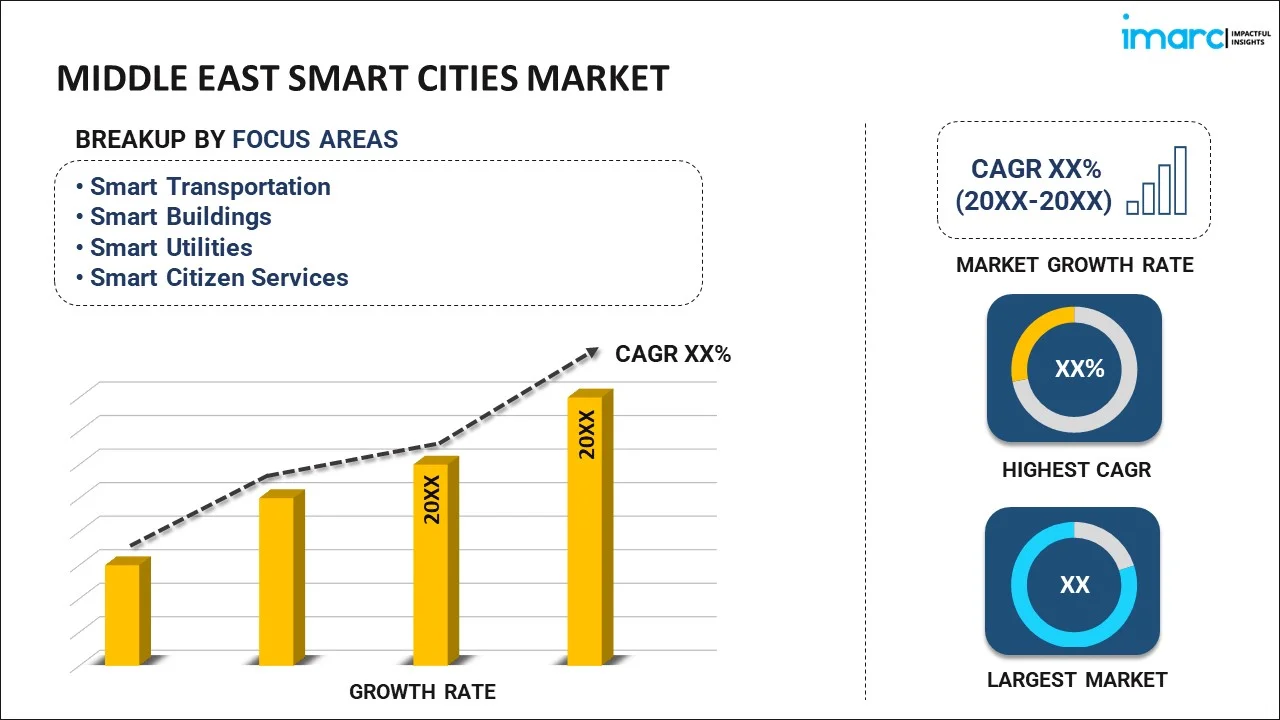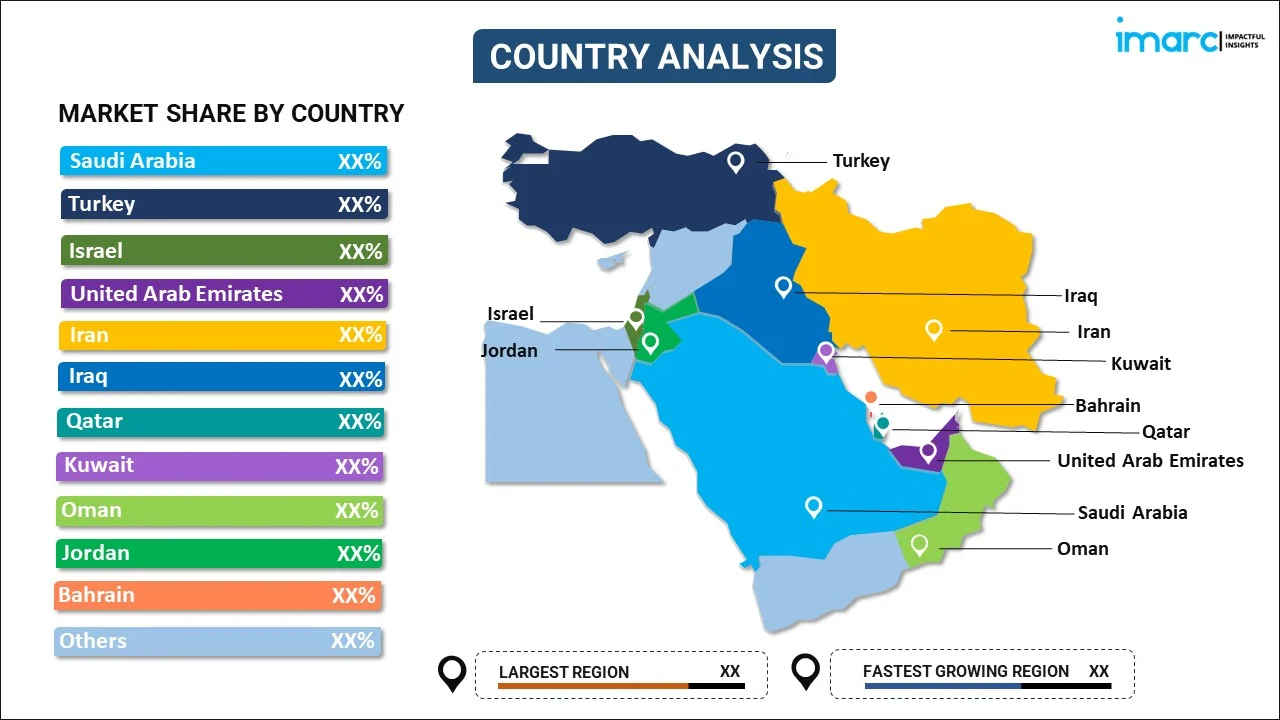
Middle East Smart Cities Market Report by Focus Area (Smart Transportation, Smart Buildings, Smart Utilities, Smart Citizen Services), and Country 2026-2034
Market Overview:
The Middle East smart cities market size reached USD 76,749.0 Million in 2025. Looking forward, IMARC Group expects the market to reach USD 4,20,270.8 Million by 2034, exhibiting a growth rate (CAGR) of 20.80% during 2026-2034. The rapid urbanization and the increasing number of individuals, the incorporation of eco-friendly practices and technologies to combat climate change, and the implementation of several government initiatives to promote the development of smart cities represent some of the key factors driving the market.
|
Report Attribute
|
Key Statistics
|
|---|---|
|
Base Year
|
2025
|
|
Forecast Years
|
2026-2034
|
|
Historical Years
|
2020-2025
|
| Market Size in 2025 | USD 76,749.0 Million |
| Market Forecast in 2034 | USD 4,20,270.8 Million |
| Market Growth Rate 2026-2034 | 20.80% |
Access the full market insights report Request Sample
Smart cities are urban areas that use advanced technologies and data-driven solutions to enhance the quality of life for their residents while promoting sustainable development and efficient resource management. These cities utilize a combination of information and communication technologies (ICT), data analytics, and smart infrastructure to optimize various aspects of urban living, such as transportation, energy consumption, public services, and environmental sustainability. It emphasizes connectivity and uses improved communication networks, including high-speed internet and the Internet of Things (IoT) devices, to allow seamless data exchange between various systems and services, which facilitates real-time monitoring and control, allowing city authorities to make informed decisions and respond swiftly to changing circumstances. They integrate smart transportation systems, which can include intelligent traffic management, global positioning-based GPS-based navigation, and real-time public transportation updates, which reduce traffic congestion, improve commute times, and enhance overall mobility. These cities deploy smart grids, renewable energy sources, and energy-efficient technologies to reduce energy consumption and minimize their environmental footprint. This helps combat climate change and also leads to cost savings for residents. Besides, public services in smart cities are often optimized through digital solutions.
Middle East Smart Cities Market Trends:
The market is primarily driven by rapid urbanization and the increasing number of individuals moving from rural areas to cities in search of better economic opportunities. This influx of urban residents has put pressure on existing infrastructure and services. Smart cities offer solutions to manage the challenges of urbanization, including traffic congestion, energy consumption, waste management, and public services. Moreover, the implementation of several government initiatives actively promoting the development of smart cities as part of their national visions and strategies, with initiatives such as significant investments in technology infrastructure, sustainable energy projects, and the implementation of smart grids, represent another major growth-inducing factor. Also, governments are encouraging public-private partnerships to accelerate smart city projects. Besides this, the Middle East is increasingly focused on sustainability and reducing its carbon footprint, which is augmenting the market growth. Along with this, smart cities incorporate eco-friendly practices and technologies, such as energy-efficient buildings, renewable energy sources, smart transportation systems, and waste management solutions to combat climate change and reduce greenhouse gas (GHG) emissions, further propelling the market growth. Apart from this, the aging infrastructure in many Middle Eastern cities needs renovation and modernization, which include the deployment of advanced technologies, including IoT sensors, 5G networks, and data analytics, to optimize infrastructure management, reduce maintenance costs, and improve overall efficiency, further creating a positive market outlook.
Middle East Smart Cities Market Segmentation:
IMARC Group provides an analysis of the key trends in each segment of the market, along with forecasts at the regional and country levels for 2026-2034. Our report has categorized the market based on focus area.
Focus Area Insights:

To get detailed segment analysis of this market Request Sample
- Smart Transportation
- Smart Ticketing
- Traffic Management System
- Passenger Information Management System
- Freight Information System
- Connected Vehicles
- Others
- Smart Buildings
- Building Energy Optimization
- Emergency Management System
- Parking Management System
- Others
- Smart Utilities
- Advanced Metering Infrastructure
- Distribution Management System
- Substation Automation
- Others
- Smart Citizen Services
- Smart Education
- Smart Healthcare
- Smart Public Safety
- Smart Street Lighting
- Others
The report has provided a detailed breakup and analysis of the market based on the focus area. This includes smart transportation (smart ticketing, traffic management system, passenger information management system, freight information system, connected vehicles, and others), smart buildings (building energy optimization, emergency management system, parking management system, and others), smart utilities (advanced metering infrastructure, distribution management system, substation automation, and others), and smart citizen services (smart education, smart healthcare, smart public safety, smart street lighting, and others).
Country Insights:

To get detailed regional analysis of this market Request Sample
- Saudi Arabia
- Turkey
- Israel
- United Arab Emirates
- Iran
- Iraq
- Qatar
- Kuwait
- Oman
- Jordan
- Bahrain
- Others
The report has also provided a comprehensive analysis of all the major regional markets, which include Saudi Arabia, Turkey, Israel, United Arab Emirates, Iran, Iraq, Qatar, Kuwait, Oman, Jordan, Bahrain, and Others.
Competitive Landscape:
The market research report has also provided a comprehensive analysis of the competitive landscape in the market. Competitive analysis such as market structure, key player positioning, top winning strategies, competitive dashboard, and company evaluation quadrant has been covered in the report. Also, detailed profiles of all major companies have been provided.
Middle East Smart Cities Market Report Coverage:
| Report Features | Details |
|---|---|
| Base Year of the Analysis | 2025 |
| Historical Period | 2020-2025 |
| Forecast Period | 2026-2034 |
| Units | Million USD |
| Scope of the Report | Exploration of Historical and Forecast Trends, Industry Catalysts and Challenges, Segment-Wise Historical and Predictive Market Assessment:
|
| Focus Areas Covered |
|
| Countries Covered | Saudi Arabia, Turkey, Israel, United Arab Emirates, Iran, Iraq, Qatar, Kuwait, Oman, Jordan, Bahrain, Others |
| Customization Scope | 10% Free Customization |
| Post-Sale Analyst Support | 10-12 Weeks |
| Delivery Format | PDF and Excel through Email (We can also provide the editable version of the report in PPT/Word format on special request) |
Key Questions Answered in This Report:
- How has the Middle East smart cities market performed so far and how will it perform in the coming years?
- What has been the impact of COVID-19 on the Middle East smart cities market?
- What is the breakup of the Middle East smart cities market on the basis of focus area?
- What are the various stages in the value chain of the Middle East smart cities market?
- What are the key driving factors and challenges in the Middle East smart cities?
- What is the structure of the Middle East smart cities market and who are the key players?
- What is the degree of competition in the Middle East smart cities market?
Key Benefits for Stakeholders:
- IMARC’s industry report offers a comprehensive quantitative analysis of various market segments, historical and current market trends, market forecasts, and dynamics of the Middle East smart cities market from 2020-2034.
- The research report provides the latest information on the market drivers, challenges, and opportunities in the Middle East smart cities market.
- Porter's five forces analysis assist stakeholders in assessing the impact of new entrants, competitive rivalry, supplier power, buyer power, and the threat of substitution. It helps stakeholders to analyze the level of competition within the Middle East smart cities industry and its attractiveness.
- Competitive landscape allows stakeholders to understand their competitive environment and provides an insight into the current positions of key players in the market.
Need more help?
- Speak to our experienced analysts for insights on the current market scenarios.
- Include additional segments and countries to customize the report as per your requirement.
- Gain an unparalleled competitive advantage in your domain by understanding how to utilize the report and positively impacting your operations and revenue.
- For further assistance, please connect with our analysts.
 Request Customization
Request Customization
 Speak to an Analyst
Speak to an Analyst
 Request Brochure
Request Brochure
 Inquire Before Buying
Inquire Before Buying




.webp)




.webp)












